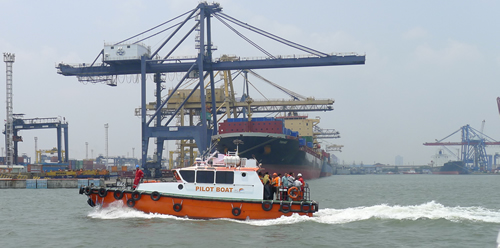With the performance of modern seaports needing to be measured if they are to be more competitive, UNCTAD held its second workshop on building a "port performance scorecard" of indicators to
refine assessment and benchmarking capability for senior managers in its Port Training Programme networks.
The workshop was held from 29 September-2 October 2015 in Jakarta, Indonesia, with the support of the Indonesia Port Corporation (IPC), also known as PT Pelabuhan Indonesia (Pelindo), and its subsidiary IPC Corporate University, also known as PT Pendidikan Maritim dan Logistik Indonesia (PMLI), with the financial support of Irish Aid.

Forty two participants from Angola, Benin, Dominican Republic, Ghana, Indonesia, The Philippines and the United Republic of Tanzania took part in the four-day workshop representing the English, French, Portuguese and Spanish-speaking networks of UNCTAD's Modern Port Management Programme.
Opening the workshop, IPC's President-Director Richard Joost Lino said he fully supported UNCTAD's TrainForTrade work, which includes with its Modern Port Management Programme, as well as the new component on port performance indicators. He said this was paramount in measuring the efficiency of ports and subsidiaries in the IPC and other Pelindo entities, which have transformed and expanded tremendously during the last five years.
Other network members contributed with data and feedback via the TrainForTrade platform and by e-mail. The objectives of the workshop were to review the structure of the "port performance scorecard", selected benchmarks, technical definitions for data, and data collection methods.

Based on a bottom-up approach, the strategy is to develop metrics that are available easily and useful to port managers. Many other performance indicators used by port managers are difficult to use when comparing between ports, while economic metrics employed in studies can be expensive to compile and are generally not used by managers on a regular basis. Using the "port performance scorecard" method however, allows managers to collect data based on available, timely, useful, and comparable information.
The instructors presented the results of data collection for the port entities that participated in the first workshop on port performance indicators that was held in Manila, the Philippines, in October 2014, with data in five main categories covering the period 2010 to 2013:
- Port governance, competition, ownership and economic regulation
- Finance data
- Vessel operations
- Cargo operations
- Human resources
At the end of the workshop a memorandum was prepared containing the changes to the list of indicators as well as the names and contact points for each port ready to pursue the system. The Ambassador of Ireland to Indonesia Kyle O'Sullivan, and representatives of IPC and PMLI, attended the closing of the workshop. Participants received a certificate and were urged to continue their support and contributions towards the port performance efforts.
The workshop was the result of recommendations adopted during a coordination meeting in Belfast, Northern Ireland, United Kingdom in July 2013.
Port visit
A visit by pilot boats to the New Tanjung Priok Port, also known as Kalibaru, was organized as part of the workshop. The Kalibaru Terminal project is one of the biggest public projects in Indonesia, valued at $4.7 billion and covering 392 hectares in North Jakarta.

Phase 1 of the project will have the capacity to handle 4.5 million twenty-foot equivalent units (TEUs) of containerized cargo and will accommodate triple-E class container ships (each able to carry up to 18,000 TEUs).
The IPC is set to build 22 ports in the country in the next five years from Belawan to Sorong, at an anticipated cost of around $3.5 billion, in support of the Indonesian government's plan to turn Indonesia into a maritime axis. The Indonesian port projects are to be financed by cash and loans and once completed each will have a capacity of 2.5 million TEUs.
This project is a continuation of Indonesia's previous decision to seek $7 billion in funding for its "Maritime Highway" initiative supported by Indonesian President Joko Widodo to develop the country's maritime potential
Source: UNCTAD